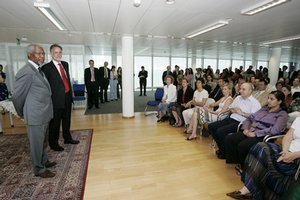WTO : Ministers Try to Salvage Doha Talks
welcome aboard amit's official Blog
Courses on conflict management often say how it is better to have
a win-win resolution to a conflict, but it is seldom told by the
pedagogues the difficulty that lies lurking. The Doha round of talks
among the heavyweights of WTO to create a global free trade policy
is a classic lesson that can be taught to every student of the fore
mentioned course. It has been four long years and the talks have not
yet resulted in a fruitfull agreement. It is difficult to comment on
the outcome of the talks that would take place soon, some quoting
them as the last attempt to come to an agreement. With the likes of
India, China and Brazil on one side representing the 149
strong "developing nations" group and the EU along with the
Economic gaint United States on the other it is a very difficult
possibility that a Win-Win Situation is the ultimate outcome.
A look at the history shows that the primary reason in
establishing a World Trade Organization is to allow countries to
levrage the oppurtunities existing all over the globe rather than
those specific to a region. Free Trade above all is the main motto
with which WTO functions. Reducing the high tariffs and other trade
barriers that were in operation in the past can be said to be the
most successful of WTO's achievements overall. But having said all
this it is not to claim that the WTO has been really successful.
Countries have found other ways of mitigating competition from the
external sources and the US is the perfect example. The US in order
to protect it's local farming sector has ganted subsidies in the
range of billions of dollars to it's farmers. The EU on the other
hand, still maintains huge tariffs, thus protecting itself from the
competition. The "Developing nations" meanwhile are seeing a lot of
growth in services sector and other manufacturing areas where
factors like resource abundance and low cost of labour paly a major
role. In order to protect their local industries from the higly
advaced western manufacturing sector these developing nations have
levied high duties on imports from the west.
The Doha Round of Trade Talks was aimed at resolving all these
disputes and creating a trade atmosphere benificial to all the
countries. The trade talks have not been fruitful because of some of
the following reasons.
a ) The pressure within the US against the cut in the large scale
subsidies enjoyed by the local farmers.
b) EU's reluctance to decrease it's tariff rates to the extent that
countries like India and Brazil are demanding.
c) Reluctance on part of Brazil, China and India to lower the
tariffs in their countries as long as the Western countries do not
carry out the required reforms from their side.
The above factors are some of the most important. EU is especially
adamant at the lowering of tariffs because it fears competition from
not only the latin american and Asian countries but also from the
US. EU has agreed to lower the tariffs to approximately 38p.c, but
Brazil and India are firm about decreasing it further. On the Other
hans the US is still in a fix upon the cut in the subsidies demanded
by the developing nations. With the fast approaching mid-term
elections President Bush cannot take a step that would adversly
effect his party. However it is all over the news that an agreement
has been reaches behind the doors that US would cut down the
subsidies by 60p.c and India and Brazil would lower the tariffs from
their side. However it is just a speculation and it remains to be
seen, what the outcome of the talks will be.
To Sum it up, Given the huge stakes that are involved, it is really
difficult to come to a perfect solution that can be agreeable to all
the parties. Havin said this it is not to say that there is a lot of
skepticism about the outcome. Every one is waiting with plenty of
anxiousness for the result, For this would provide an entirely new
dimension the world wide trade.
Prasad



No comments:
Post a Comment